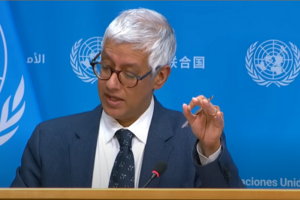‘Christian Nationalism,’ ‘Never-Trumpers’ and Other Biased Terms This Election Season

With the 2024 Presidential Election underway, new terminology and witty commentary are in full swing, from nicknames like“MAGA Mike Johnson” and “Sleepy Joe” to more weighted terms such as “Christian nationalism” and “immigration invasion.”
Many terms are being used as snappy attacks— and reveal a political bias, depending on how they are used.
These digs are often thrown by one political group at another, but lately, there has also been a shift: amid intra-party division, Republicans are attacking each other.
Catchy terms are often polarizing and exaggerated, making them common in popular tabloids and on social media. This makes it easier for media consumers to get trapped in filter bubbles.
Related: How the Use of Polarized Labels Masks Americans' Shared Values
While many of the following terms are often used with negative connotations to describe a political group or a subset of it, these connotations are not necessarily true and are frequently divisive.
For example, a news organization’s reference to a politician as an “extremist” may smear that person’s reputation — but at the same time, “extremism” is a more relative term and likely to be subject to the organization’s bias. What is an “extreme” view to one camp is perfectly reasonable to another.
In addition, political and social groups have a long history of “reclaiming” or redefining various terms and phrases to better fit their own communities and narratives.
Related: What 'Social Justice' means to Liberals & Conservatives | AllSides Red Blue Translator
So-called “Christian nationalism” has received extensive attention from both liberal and conservative news outlets this election year. Christianity Today (Center bias) defines it as “the belief that the American nation is defined by Christianity [Christian values generally and Christian beliefs more specifically], and that the government should take active steps to keep it that way;” however, its implications are framed quite differently on each end of the political spectrum.
Liberal commentators tend to warn of the “danger” that is associated with Christian nationalism, particularly referencing events such as Jan. 6, 2021– when some U.S. Capitol building rioters were photographed with religious paraphernalia. They also frequently accuse it of being a threat to democracy.
According to an opinion published in Time Magazine (Lean Left bias), Christian nationalism purportedly values “strict moral traditionalism,” “comfort with authoritarian control,” and “a desire for strict ethno-racial boundaries around who is a ‘true’ American.” The article defines Christian nationalism as “an ideology that asserts all civic life in the U.S. should be organized according to a particularly conservative and ethnocentric expression of Christianity;” however, many criticisms of Christian nationalism include different definitions and connotations, making the term loose and blurry at times.
Some conservative outlets have criticized uses of the term and its associated accusations. Washington Examiner (Lean Right bias), for instance, stated, “the Left has used it to paint a caricature of a dogmatic Republican voter base focused on stripping rights from Americans,” and “the ideology does not prescribe Christianity as a requirement for Americans or their leaders; instead, it seeks to anchor policy-making to the Christian idea of a universal morality rather than accepting the Left’s fluid or circumstantial sense of morality.”
In 2022, President Joe Biden repeatedly referred to “MAGA Republicans” as a “threat,” saying they (specifically in regards to Republican claims of fraud during the 2020 Presidential Election) “do not believe in the rule of law.”
The term “MAGA Republicans” received closer attention after some congressional Republican leaders opposed “bipartisan” legislation former President Donald Trump had denounced. House Speaker Mike Johnson (R-LA) (dubbed by some Democrats as “MAGA Mike Johnson”) and other Republican representatives were accused of falling in line with the opposition merely because of Trump’s rejection, resulting in intra-party tensions and animosity.
“Never-Trumpers” such as Mike Madrid of the Lincoln Project, Adam Kinzinger of CNN (Lean Left bias), and Sarah Longwell of The Bulwark (Lean Right bias) are the aptly-named Americans who refuse to support Trump, despite their conservative political affiliations or beliefs.
“Never-Trumpers” have been accused, often by “MAGA Republicans,” of being “RINOS” (“Republicans in Name Only”) in some political settings, arguing that the refusal to vote for Trump as the Republican nominee goes against conservative values.
The American media at large has struggled to settle on a term to describe the mass entry of unauthorized migrants into the United States. Meanwhile, some conservatives have dubbed it an “invasion,” usually while criticizing the Biden administration and Democrat-run states for their immigration policies.
Gov. Greg Abbott (R-TX) declared an “invasion” on the Texas-Mexico border, citing constitutional requirements (Articles I and IV) “to invoke Texas’s constitutional authority to defend and protect itself.”
Sen. Tim Kaine (D-VA) recently said, “It’s an immigration crisis. It’s a national security issue… I think you got to be careful throwing around words like ‘invasion.’”
An opinion published by El Paso Matters (Center bias) tied the term “invasion” to violence and racism, referring to the characterization as a “white nationalist conspiracy theory.”
The term “cultural Marxism” is typically used by conservatives and classical liberals to accuse progressive liberals of harboring socialist ideologies and endorsing a non-meritocratic and collectivist view that ignores individuals.
Related: What 'Marxist/Marxism' means to Liberals & Conservatives | AllSides Red Blue Translator
While the left typically does not use or endorse the term, those who do may describe cultural Marxism as “consider[ing] cultures and ideologies as inextricably linked to the economic, social, and political context: they are tools in the hands of the powerful to control [people],” according to The Journal of Social, Political and Economic Studies (not rated).
On the other side, The Heritage Foundation (Right bias) states, “Unless Marxist ideas are defeated, their proponents will push the United States to follow a totalitarian ideology that obliterates freedom and opportunity.” Similar to how the left often criticizes “Christian nationalism,” conservatives often use the term “cultural Marxism” to describe a “threat to America’s liberties.” Many believe cultural Marxism allows a person or group to wield their supposed status as a member of an oppressed group (usually based on identity signifiers such as race, sexual orientation and gender) to shift the power dynamics in society (for better or worse, depending on one's ideologies).
Related: What "Equity" Means to Liberals and Conservatives
In defense of accusations, liberal outlets have long referred to “cultural Marxism” as a “conspiracy theory” used as slander by far-right conservatives.
Institutions such as universities, tech companies and news sources are typically centered in blue states/cities and tend to employ more liberals than conservatives, thus creating a “media elite.”
According to the AllSides Red Blue Translator™, “To those on the right, the term ‘liberal media’ is an accurate description of systemic, intentional bias across major media outlets. Those on the left tend to dismiss this assertion as inaccurate and even, in some cases, paranoid. They point to the influence of Fox News (Right bias) and similar media as evidence against the idea of liberal-dominated media.”
“Cult” has been a term with controversial connotations for a long time, and its origins go as far back as Ancient Greece. The term is usually associated with obsession, lack of critical thought, abnormal lifestyles and worship, and brainwashing.
This election year, the term is being used as a slanted, accusatory and fear-inducing political device by voices from various points of the political spectrum—typically to imply that those in the other camp are not critical thinkers and are blind followers to a political ideology.
“Woke” people have been accused of being cultish for their roots in Marxist ideologies and calls to defund the police, which critics say encourages violence and crime. Similarly, “MAGA Republicans” have been accused of being a cult for their supposed authoritarian leanings. In May 2024, former House Speaker Nancy Pelosi referred to Trump supporters as a “personality cult centered around one man.”
Organized Christian denominations—particularly Mormonism and Jehovah’s Witnesses—have also been described as cults; but Catholicism is a more socially complex denomination within this issue. Devout Catholics (along with other Christians) often have strong political views, particularly on issues like abortion, that make the group more susceptible to media criticisms.
Additionally, some leaders of the Catholic Church have been involved in widespread wrongdoing in the past, including cases of pedophilia, muddying the religion’s name and its actual teachings for many people. This is despite the fact that actual biblical teachings do not even remotely condone any such behavior. On top of that, “The word [cult] itself derives from the Latin cultus, which means worship. It is the root of other words with positive connotations: culture, cultivation,” according to a CatholicSay (not rated) blog. Therefore, worship in the Catholic Church may have subjectively cultish connotations for some and honorable connotations for others, depending on how it is viewed.
An authoritarian, in contrast to a libertarian, is someone who is “typically willing to give a large degree of control over their life to whatever forms of authority they believe to be legitimate. They also tend to believe other people should do the same,” according to the AllSides Red Blue Translator™.
This term is used against anyone who is anywhere on the political spectrum, but former President Trump has been particularly accused of purportedly having authoritarian tendencies. His supporters are often given the “authoritarian” label by critics, as well. This criticism has recently been fueled by the aforementioned opposition to the “bipartisan” border deal and various viral comments.
On the other hand, conservatives often argue there is a growth of authoritarianism on the left that slowly and quietly grows year after year. For instance, government financial control via COVID-19 restrictions, higher taxes, controversial gun regulations in some states, cancel culture that specifically affects people with dissenting views, and left-wing domination of healthcare and education systems, they claim, are mirror images of what authoritarian governments have successfully done in other countries. Those issues, in addition to bipartisan free speech concerns, are seen by the right as a bigger threat than anything Trump has done, including his actions (allegedly and evidentially) on Jan. 6, 2021.
“Extremism” is an encompassing term often flung from one end of the political spectrum to the other; it is used to decry anything deemed outside what is normal, acceptable, or expected. The terms “far left” and “far right” are frequently used by media and commentators in a sensationalist manner to paint another side as being extremist and far outside “acceptable” bounds. Those on the far left are often referred to as “leftists,” “progressives” and “snowflakes;” and those on the far right are often referred to as “right-wing extremists,” “fascists,” and even “neo-Nazis.”
“Alt-right” is also a term associated with the far right, though it is not as commonly used as it was around 2016 [the year of Trump’s first presidential election]; and it is more closely associated with accusations of white nationalism and radicalization.
As polarizing terms get flung around to discredit one side or another, their definitions become somewhat arbitrary. What one person feels is extreme, bad, outside the bounds of acceptability, or uncouth, another may feel is completely acceptable or even normal. This depends not only on culture, values, and political affiliations, but also filter bubbles, bias, and basically everything but the kitchen sink. Perhaps the terms themselves are the greatest threats of all to this pivotal presidential election.
See more of these kinds of terms and phrases with the AllSides Red Blue Translator™.
–
Malayna J. Bizier is a News Assistant for AllSides. She has a Right bias..
This piece was reviewed and edited by Andy Gorel, News Editor and Bias Analyst (Center bias); Henry A. Brechter, Editor-in-Chief (Center); John Gable, Co-founder and CEO (Lean Right); Julie Mastrine, Director of Marketing and Media Bias Ratings (Lean Right); and Joseph Ratliff, Content Designer and News Editor (Lean Left).

May 21st, 2024

May 16th, 2024

May 16th, 2024

May 16th, 2024